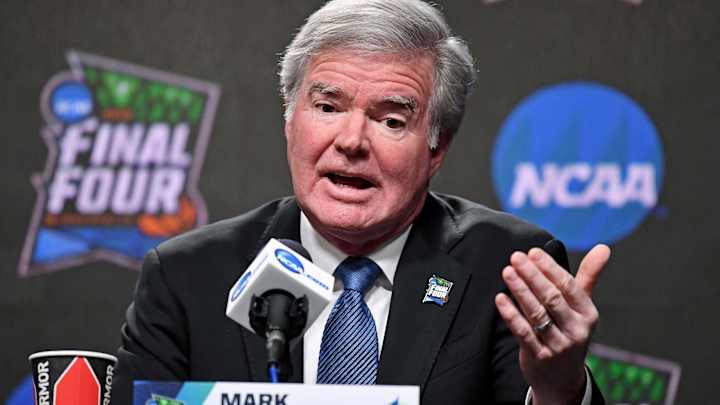The NCAA Eliminates NIL Restrictions, Allowing Athletes to Earn Money

The NCAA, which went kicking and screaming toward this day, announced what it termed an interim policy allowing college athletes the opportunity to financially benefit from their name, image and likeness, beginning Thursday.
The announcement suspends all existing NIL rules the NCAA has clung to and permits athletes to begin accepting endorsement benefits related to use of their name, image or likeness in any legal activity.
This paves the way for athletes to potentially make money from autograph signings, personal appearances, endorsements, through their social media platforms or by providing lessons or sponsoring sports camps.
Athletes will be allowed to sign with agents for the purpose of helping them secure endorsement deals.
NCAA president Mark Emmert, who has led the way in the NCAA dragging its feet on this, called it “an important day for college athletes,” adding that the NCAA will continue to work with Congress to “develop a solution that will provide clarity on a national level.”
Seven states already have passed laws that would permit athletes to benefit from NIL opportunities, which virtually forced the hand of the NCAA in order to assure a level playing field across the country.
Alabama, Florida, Georgia, Kentucky, Mississippi, New Mexico, Ohio and Texas already had passed laws allowing college athletes to begin earning money as of Thursday. The NCAA had hoped Congress would adopt a national policy, but Washington has declined to act on the issue so far.
At least for now, that doesn’t matter. Athletes at all schools, including in California, may now find creative ways to earn money that were deemed a violation of NCAA rules until now.
The change was approved Wednesday by the NCAA Board of Directors after a recommendation on Monday from the NCAA Division I council that includes conference commissioners and university athletic directors.
Here are the key points from Wednesday’s announcement by the NCAA:
- Individuals can engage in NIL activities that are consistent with the law of the state where the school is located. Colleges and universities are responsible for determining whether those activities are consistent with state law.
- College athletes who attend a school in a state without an NIL law can engage in this type of activity without violating NCAA rules related to name, image and likeness.
- Individuals can use a professional services provider for NIL activities.
- Student-athletes should report NIL activities consistent with state law or school and conference requirements to their school.
Cal athletic director Jim Knowlton touched on the topic in his monthly report, “Knowlton’s Notes,” which was released before the NCAA’s announcement:
“On a national level, I expect that this year will bring a great deal of change to college athletics with the implementation of name, image and likeness (NIL) legislation and new guidelines following the recent Alston decision from the U.S. Supreme Court that removes limits on education-related benefits.
“For the past several months, we have been studying the issues through a working group that includes staff, coaches, current and former student-athletes, and members of our faculty.
“We will always be in favor of supporting our student-athletes and will be announcing a comprehensive plan around NIL very soon that takes advantage of some of the vast resources at the country’s No. 1 public university, such as the Cameron Institute, INFLCR and experts across campus.
“We are also reviewing the Alston case with our colleagues in the Pac-12 and across the NCAA to understand its implications and how to abide by the ruling. I’m sure there will be much more to come as the college sports environment continues to evolve.”
The Alston case was settled by the Supreme Court last week, allowing schools to reward athletes for classroom achievement, including academic awards and paid internships. The NCAA had to look at that ruling and recognize the courts no longer seemed interested in providing them antitrust cover.
Wednesday’s ruling represents another step in removing the facade of amateurism on a college landscape where football and basketball coaches often earn seven-figure salaries, TV money is enormous and fans pay hundreds of dollars to attend major college football and basketball games.
But this change does not involve the NCAA or universities sharing revenue with athletes, and it doesn’t address significant issues such as workman’s compensation or long-term health insurance to cover injuries sustained while representing a school. Until those issues are resolved we can expect continued legal assaults on the status quo of college sports.
The reality is many college athletes won’t experience significant benefit from this opportunity. The utility infielder on the baseball team or the second doubles player on the women’s tennis team may find limited opportunities to cash in.
But high-visibility athletes in basketball and football might be able to begin making money they didn’t expect until turning pro. Some wonder if an elite basketball prospect, convinced he can now earn money while playing college ball, might temporarily hold off for a year on moving to the G League or eventually the NBA, provided the league eliminates its one-and-done rules.
And Olympic sports stars could also secure sponsorship deals related to gear or products that weren’t previously permitted.
Cover photo of NCAA president Mark Emmert by Robert Deutsch, USA Today
Follow Jeff Faraudo of Cal Sports Report on Twitter: @jefffaraudo

Jeff Faraudo was a sports writer for Bay Area daily newspapers since he was 17 years old, and was the Oakland Tribune's Cal beat writer for 24 years. He covered eight Final Fours, four NBA Finals and four Summer Olympics.